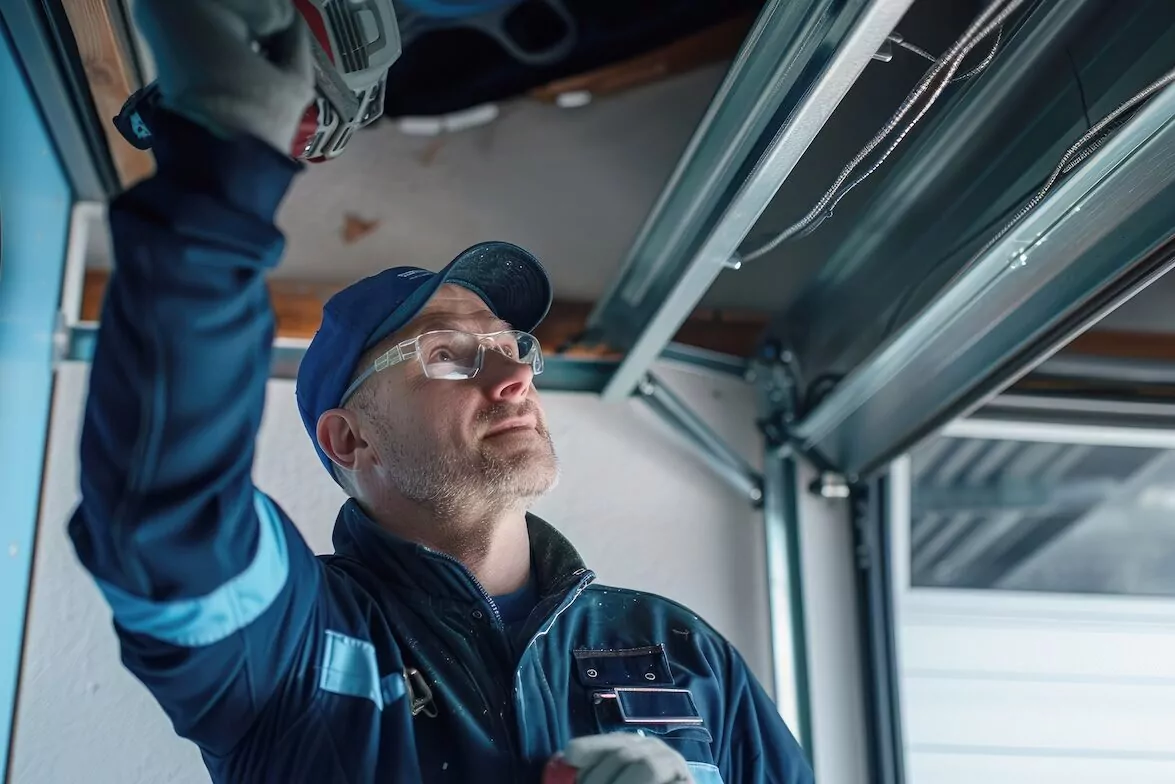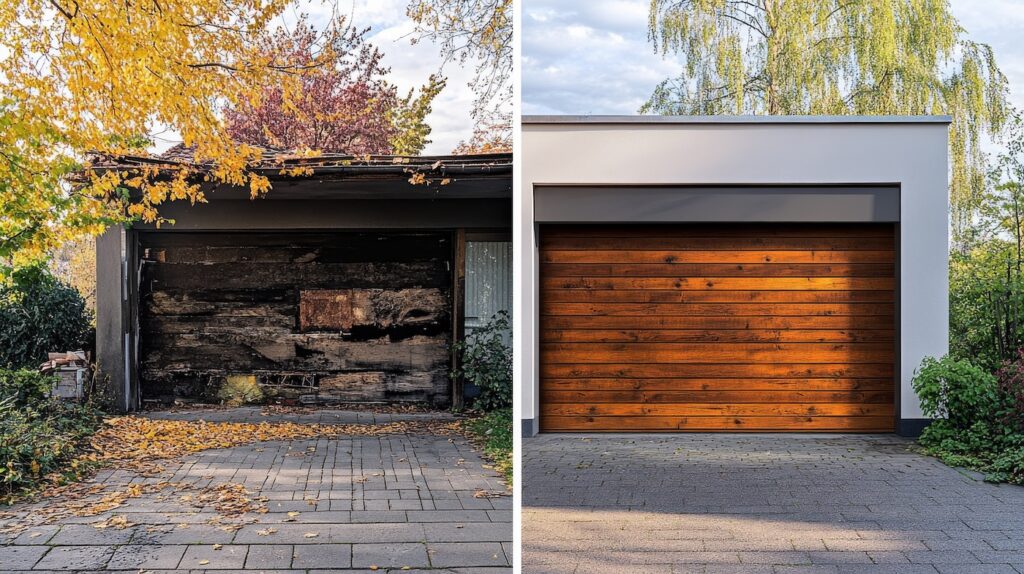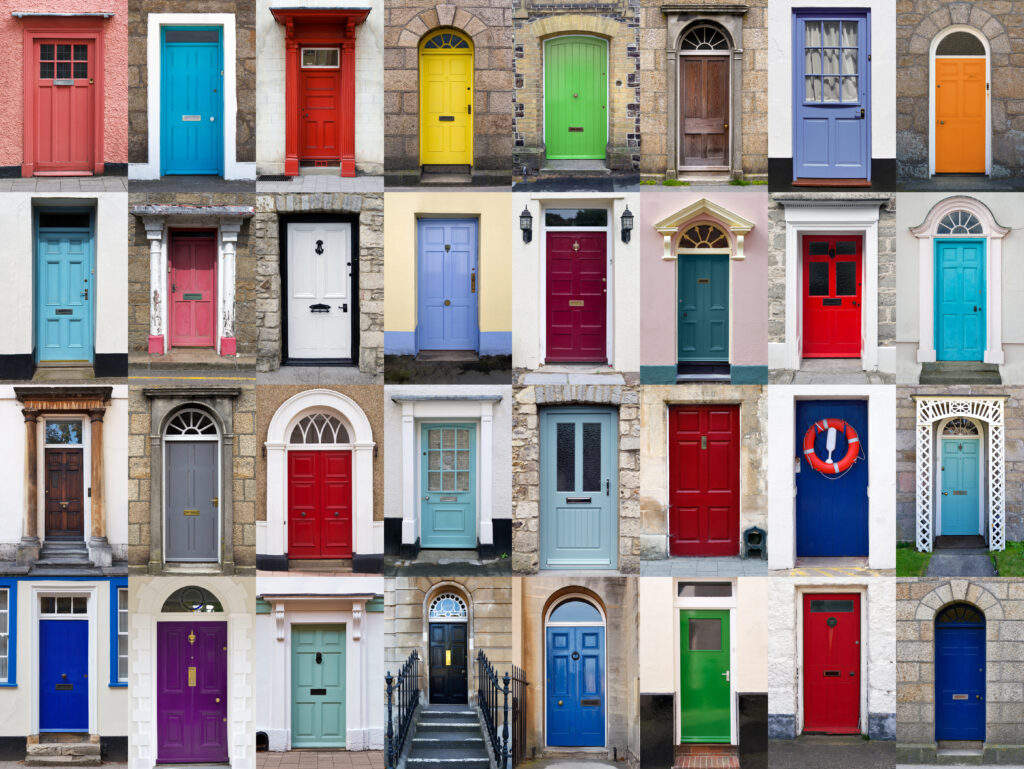Sick and tired of staring at that worn-out garage door? Your home’s curb appeal deserves more. Garage door replacement isn’t just about aesthetics—it’s a strategic home improvement investment that can improve your property value, security, and make your home more energy efficient. Read on to discover everything you need to know about garage door replacement costs to make an informed budget decision and accomplish your home improvement goals.
Understanding Garage Door Replacement Costs

A garage door is more than just an entry point; it’s a key component of your home. Whether you’re replacing an outdated door or considering the right material for a new one, understanding the process is essential to making an informed choice.
Definition of Garage Door Replacement
Replacing a garage door is a multi-step process that starts with removing the old, selecting a new one, and completing the installation. Removing a garage door requires detaching the opener, and manually lowering the door. Springs, cable, and tracks are then disassembled. Selecting a new door involves choosing a material such as steel, wood, aluminum, composite, or something else. Garage doors also include other features such as windows and smart home integrations. Once you’ve selected the perfect door for your home, it’s time to install it. This process involves setting up the tracks, rollers, and mounting hardware, as well as attaching and balancing the new door. Last but not least the garage door opener needs to be tested and adjusted if needed. While you’re at it, it might not hurt to clean the inside of your garage too.
Types of Garage Doors
Garage doors come in four popular materials including wood, steel, aluminum, and fiberglass. Wooden garage doors are highly customizable and come in rich, natural textures, However they require regular maintenance to prevent warping, rotting, and fading and cost more compared to other materials. Steel garage doors are durable, long-lasting, low maintenance, and energy efficient yet prone to dents, scratches and can rust if not treated. Aluminum garage doors are lightweight, reducing strain on garage door openers, and rust-resistant (ideal for wet places). They also happen to be prone to dents and are limited in their insulation options. Finally, fiberglass garage doors are lightweight, resistant to corrosion, moisture, and salt, and can mimic wood at a lower cost. They’re also prone to cracking in extreme cold and are limited in durability compared to steel or wood.
Average Garage Door Replacement Cost

Understanding the factors that influence the price of garage door replacement is essential when planning your budget. Costs depend on materials, complexity of the design, and the garage door size, so it’s important to consider all aspects before proceeding with replacement.
Average Cost of Garage Door Replacement
The cost of replacing a garage door can vary widely, typically ranging from $750 to $6,325, with an average cost of around $2,743. For budget-friendly options consider practical options including basic steel or aluminum garage doors without insulation or customization. For high-end garage door shoppers, premium wood or insulated steel doors with custom designs, windows, and smart technology can enhance home aesthetics, energy efficiency, and overall luxury.
Garage Door Replacement Cost by Size
Understanding garage door sizing is crucial for accurate budgeting and planning. The size of your garage door can significantly impact the cost. See breakdown below.
| Garage Type | Average Cost | Cost Range | Notes |
| Single-Car Garage | $1,950 | $500–$3,000 | Basic designs cost less, while premium materials and features increase cost. |
| Double-Car Garage | $2,813 | $750–$5,000 | Single large doors or dual configurations available; complexity increases pricing. |
| Two Separate Doors | $3,233 | $1,200–$4,900 | Ideal for multi-vehicle homes; adds flexibility in use. |
| Three-Car Garage | $3,233–$4,767 | $1,300–$7,200 | Larger installations for extensive garages; project costs vary widely. |
Additional Cost Considerations with Garage Door Replacement
When budgeting for a garage door replacement, it’s important to consider additional costs.
Labor Costs
Labor costs for professional garage door installation typically range between $150 and $500, depending on the door size, material, and installation complexity. For custom doors or high-end installations, labor fees can exceed $600.
Garage Door Opener Replacement
Replacing or upgrading a garage door opener typically costs between $220 and $700, including both the device and installation. Note chain-driven openers, which are reliable but noisier, start at around $150 for the unit. High-end options include belt-driven or smart openers and can cost upwards of $500. Installation fees for garage door openers range from $100 to $200.
Hardware and Accessories
The cost for handles, locks, and hardware depends on the type and style. Basic handles and locks range between $10–$50 each. Decorative hardware kits cost $50–$200, including hinges, pulls, and straps. Finally, custom hardware prices vary significantly, with high-end materials, such as wrought iron, adding $200 or more.
Comparison with Other Home Improvement Options
When considering your garage door options, it’s important to weigh the pros and cons of different choices. Read on for a comparison between repair and replacement, as well as deciding between replacement and painting.
Repair vs. Replacement
To decide between repairing or replacing a garage door, the choice hinges on the extent of damage and associated costs. Minor repairs, such as replacing a spring or fixing a track, are practical when the door structure and functionality are intact. However, if the door is severely damaged, outdated, or inefficient, a full replacement may be necessary.
Garage Door Replacement vs. Painting
The benefits of replacing a door versus refinishing it depends on your goals. Painting is a cost-effective option to enhance curb appeal and is ideal for doors in good structural condition but with faded or peeled finishes. Replacing a garage door, however, offers long-term benefits including enhanced energy efficiency, improved security, and increased home value.
Factors Influencing Garage Door Replacement Costs

When replacing your garage door, understanding how material choice and installation method affect both cost and long-term performance is crucial. Here’s what to consider when selecting the right material and deciding between DIY or professional installation.
Material and Style
Selecting your garage door material and style will significantly affect the cost of your garage door. Steel doors are durable, low-maintenance solutions. Wood doors, on the other hand, offer a classic aesthetic but are higher maintenance and more expensive. Composite doors can mimic the appearance of wood with better durability.
Note that garage door style also influences pricing. Modern or minimalist designs cost more due to their sleek aesthetic. Carriage house styles including ornate details or windows are also on the more-expensive side. Insulation, windows, and decorative hardware further impact final costs.
DIY vs. Professional Installation
While DIY garage door replacement saves on labor expenses, it comes with risks including improper installation and safety issues, especially when handling tension-loaded parts and the sheer weight of garage doors. Professionally installed garage doors provide proper alignment and safety, and are worth the investment to avoid costly DIY mistakes.
Getting Accurate Estimates

When planning your garage door replacement project, it’s essential to take a few strategic steps to get the best value for your investment. Here’s how to shop smart and understand what you’re paying for.
Tips for Getting Quotes from Contractors:
A great way to shop smart during garage door replacement is to reach out to multiple contractors to compare pricing, services, and experience. Additionally, quotes should include all costs such as labor, material, door removal, and additional services such as weatherproofing or insulation. If you have any questions, be sure to ask about warranties, timelines, or specific project details.
Understanding Cost Breakdowns:
When shopping around make sure to look for hidden fees including upgrades like insulated panels. Request an itemized list to avoid any surprises. Be sure to clarify whether adding hardware, decorative features, or weatherproofing will increase the cost.
Conclusion
Garage door replacement is more than a cosmetic upgrade—it’s an investment in your home’s functionality, security, and value. By understanding the various factors that influence cost, you can make an informed decision that balances quality, performance, and budget. Connect with a Tasker who can provide qualified garage door replacement today!














